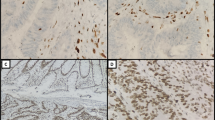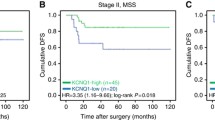Abstract
Large bowel adenocarcinoma is one of the most frequent human neoplasms and despite recent insights into the pathophysiology and molecular basis of this disease, mortality remains high in advanced and metastatic cases. Most guidelines recommend adjuvant chemotherapy for tumours involving lymph nodes, but not for patients with localized stage I or II disease. However, it is well known that approximately 20% of stage II colorectal carcinoma patients eventually recur, mainly with distant or peritoneal involvement and show bad prognosis. It would be important to predict which patients are at increased risk of recurrence to guide potential adjuvant therapy use in this controversial setting. In this sense, only microsatellite stability has been proposed as a predictive tool in some guidelines. The tripartite motif family protein 72 (TRIM72) is a ubiquitin ligase, involved in the cell membrane repair machinery and known to be associated to insulin resistance. Its potential role in colon cancer has recently been proposed. The aim of this study is to determine the potential predictive value of TRIM72 immunohistochemical expression in stage II colon carcinoma. We have retrospectively reviewed a series of 95 patients with stage II colon microsatellite stable carcinomas operated with a curative intent at a single large tertiary hospital in Madrid (Spain) between 2006 and 2012. None of the patients received adjuvant chemotherapy. We reviewed the histopathological slides and constructed a tissue microarray (TMA) of three representative areas to perform immunohistochemical staining for TRIM72. In our series 30 patients (31.7%) recurred after a median follow-up of 17.5 months. Lack of immunohistochemical expression of TRIM72 in the tumor was significantly and independently associated to recurrence. A recent report by Chen et al. has shown that TRIM72 can be measured in plasma for colon carcinoma detection as an alternative to CEA or CA19.9, with lower levels in patients with carcinoma. Our report is the first one to show that lower immunohistochemical expression of TRIM72 predicts recurrence in colon stage II carcinoma. We feel this predictive influence can be related to its crucial role as a central regulator in many signaling pathways (PI3K-AKT, ERK). As an ubiquitin ligase, the lack of TRIM72 could increase the levels of several potential oncogenic molecules and therefore lead to a more aggressive phenotype. It remains to be shown whether chemotherapy could change the clinical behaviour of this bad prognosis group. We propose TRIM72 immunohistochemical analysis as a potential tool to predict recurrence risk in stage II colon carcinoma patients. Our results should be confirmed in larger series, but could open the way to management strategies refinement in this early stage group of patients.


Similar content being viewed by others
References
Siegel RL, Miller KD, Jemal A (2016) Cancer statistics 2016. CA Cancer J Clin 66:7–30
Shui L, Wu YS, Lin H, Shui P, Sun Q, Chen X (2018) Triplet chemotherapy (FOLFOXIRI) plus bevacizumab versus doublet chemotherapy (FOLFOX/FOLFIRI) plus bevacizumab in conversion therapy for metastatic colorectal Cancer: a meta-analysis. Cell Physiol Biochem 48:1870–1881
Osterman E, Glimelius B (2018) Recurrence risk after up-to-date Colon Cancer staging, surgery, and pathology: analysis of the entire Swedish population. Dis Colon rectum 61:1016–1025
Böckelman C, Engelmann BE, Kaprio T, Hansen TF, Glimelius B (2015) Risk of recurrence in patients with colon cancer stage II and III: a systematic review and meta-analysis of recent literature. Acta Oncol 54:5–16
Maeda C, Hidaka E, Mori Y, Mukai S, Miyachi H, Sawada N (2015) Tumor diameter is an easy and useful predictor of recurrence in stage II colorectal Cancer. Dig Surg 32:338–343
Lemekert FA, Bournazos A, Eckert DM, Kenzler M, Hawkes JM, Butler TL et al (2016) Lack of MG53 in human heart precludes utility as a biomarker of myocardial injury or endogenous cardioprotective factor. Cardiovasc Res 110:178–187
Liu L, Wong CC, Gong B, Yu J (2017) Functional significance and therapeutic implication of ring-type E3 ligases in colorectal cancer. Oncogene 37:148–159
Chen Z, Yin X, Li K, Chen S, Li H, Li Y, Zhang Q, Wang H, Qiu Y (2018) Serum levels of TRIM72 are lower among patients with colon cancer: identification of a potential diagnostic marker. Tokohu J Exp Med 245:61–68
Wille-Jørgensen P, Syk I, Smedh K, Laurberg S, Nielsen DT, Petersen SH, Renehan AG, Horváth-Puhó E, Påhlman L, Sørensen HT, For the COLOFOL Study Group (2018) Effect of more vs less frequent follow-up testing on overall and colorectal Cancer-specific mortality in patients with stage II or III colorectal Cancer: the COLOFOL randomized clinical trial. JAMA 319:2095–2103
Hu X, Li YQ, Li QG, Ma YL, Peng JJ, Cai S (2018) Mucinous adenocarcinomas Histotype can also be a high-risk factor for stage II colorectal Cancer patients. Cell Physiol Biochem 47:630–640
Lee VWK, Chan KF (2018) Tumor budding and poorly-differentiated cluster in prognostication in stage II colon cancer. Pathol Res Pract 214:402–407
Yamadera M, Shinto E, Tsuda H, Kajiwara Y, Naito Y, Hase K, Yamamoto J, Ueno H (2018) Sialyl Lewisx expression at the invasive front as a predictive marker of liver recurrence in stage IIcolorectal cancer. Oncol Lett 15:221–228
Li C, Cai S, Wang X, Jiang Z (2015) Identification and characterization of ANO9 in stage II and III colorectal carcinoma. Oncotarget 6:29324–29334
Li C, Cai S, Wang X, Jiang Z (2014) Hypomethylation-associated up-regulation of TCF3 expression and recurrence in stage II and III colorectal cancer. PLoS One 9(11):e112005
NCCN Guidelines Version 3.2018 Colon Cancer. Copyright National Comprehensive Cancer Network Inc. Last accessed online 9/20/2018
Acknowledgments
This report is in accordance with Ethical standards and has been approved by the Ethical Committee for Research of Hospital Fundación Jimémez Díaz.
Author information
Authors and Affiliations
Contributions
MJFA has selected the representative areas of the tumour, reviewed the histopathological slides, reviewed the literature and written the text.
MC has constructed the TMA and performed immunostains.
JSV has contributed to patient selection and demographic information.
JIC has contributed to the TMA construction and has read and reviewed the manuscript.
MACN has cut the slides and performed immunohistochemical staining.
LPN has contributed to immunohistochemical staining and data interpretation.
JGF has critically read and reviewed the manuscript.
AC has contributed to literature review, manuscript elaboration and manuscript writing.
All authors have read and approved the final version of the manuscript.
Corresponding author
Ethics declarations
Conflict of Interest
The authors acknowledge no conflict of interest for the present study.
Additional information
Publisher’s Note
Springer Nature remains neutral with regard to jurisdictional claims in published maps and institutional affiliations.
Rights and permissions
About this article
Cite this article
Fernández-Aceñero, M.J., Cruz, M., Sastre-Varela, J. et al. TRIM72 Immunohistochemical Expression Can Predict Relapse in Colorectal Carcinoma. Pathol. Oncol. Res. 26, 861–865 (2020). https://doi.org/10.1007/s12253-019-00629-w
Received:
Accepted:
Published:
Issue Date:
DOI: https://doi.org/10.1007/s12253-019-00629-w




